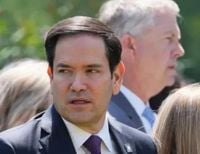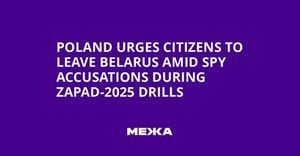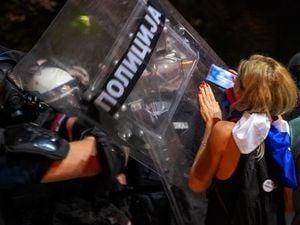In a dramatic escalation of its campaign against Latin American criminal organizations, the United States has officially designated two notorious Ecuadorian gangs—Los Lobos and Los Choneros—as foreign terrorist organizations. The announcement, made by US Secretary of State Marco Rubio during a high-profile visit to Quito on September 4, 2025, marks a pivotal moment in US-Ecuador relations and signals a new phase in Washington’s approach to regional security.
Standing alongside Ecuador’s Foreign Minister at the presidential palace, Rubio declared, “This designation brings with it all sorts of options in the United States to work in conjunction with the government of Ecuador in the future to stamp these groups out.” According to CNN, the move enables the US not only to impose sanctions but also to share actionable intelligence with Ecuador—potentially paving the way for lethal joint operations against these criminal networks.
The US decision comes amid a surge in cartel violence in Ecuador, attributed to shifting drug routes and growing competition among gangs for control of lucrative trafficking corridors. Los Lobos and Los Choneros, long blamed for contract killings, extortion, and the movement of narcotics, have been at the center of this chaos. Authorities point to their role in a wave of violence that has left hundreds dead, especially within Ecuador’s overcrowded prisons since 2021. As the Associated Press reported, these groups have capitalized on the country’s strategic location and its status as the world’s largest banana exporter, exploiting maritime shipping containers to smuggle cocaine and other drugs.
Rubio’s announcement was not just symbolic; it was accompanied by a significant pledge of support. He revealed that the US would provide $13.5 million to help Ecuador bolster its security forces, combat drugs, and address rising crime. An additional $6 million will be allocated for unmanned aerial vehicles (UAVs) to strengthen Ecuador’s Navy. As Rubio put it, “These are all very important. We’re going to do more. There’s more coming, but that’s an important step that we wanted to take here today, and I’m proud to announce it.”
The designation of Los Lobos and Los Choneros follows closely on the heels of a controversial US military strike in the Caribbean, which targeted a boat allegedly tied to Venezuela’s Tren de Aragua gang—another group recently labeled as a foreign terrorist organization by Washington. The strike reportedly killed 11 suspected traffickers, though details about the operation and its legal justification remain murky. The episode has drawn mixed reactions across Latin America, with some regional leaders expressing concern about the precedent set by unilateral US military action and the potential for broader intervention.
Rubio, however, was unapologetic. “We’re not just going to hunt for drug dealers with their little fast boats and say, ‘Let’s try to arrest them.’ No, the president said he wants to wage war,” he told reporters in Quito, as quoted by the Associated Press. He emphasized that the new US policy is to “wage war” on drug traffickers rather than simply intercepting them—a sharp departure from previous strategies. “They’ve been waging war on us for 30 years and no one has responded,” Rubio said, underscoring the administration’s determination to take a more aggressive stance.
This hardline approach is not without its critics. As reported by World Politics Review, some analysts argue that designating criminal groups as terrorist organizations provides legal cover for high-profile actions such as deportations and airstrikes, but falls short of delivering the sustained, multi-agency effort required to dismantle these networks’ financing and operations. James Bosworth, a regional security expert, observed, “The administration’s counterterrorism approach appears to be a policy designed for domestic consumption rather than international effect.”
Still, the Ecuadorian government has welcomed the US partnership. President Daniel Noboa, who requested the terrorist designations, expressed gratitude for Washington’s willingness to help “actually eliminate any terrorist threat.” According to the Associated Press, Noboa has signaled his openness to hosting US forces in Ecuador to aid in the fight against organized crime. Preparations are reportedly underway to facilitate such cooperation, reflecting the growing sense of urgency as violence escalates.
The roots of Ecuador’s current crisis run deep. After the 2016 demobilization of Colombia’s FARC rebels, cocaine production and trafficking routes shifted, with criminal groups moving closer to the Ecuadorian border. The country’s use of the US dollar, weak institutions, and a network of established gangs have made it an attractive hub for cartels from Mexico, Colombia, and even the Balkans. The United Nations’ latest World Drug Report notes that Ecuador, along with Colombia and Peru, saw increased cocaine seizures in 2022 compared to the previous year—a sign of the intensifying battle over the region’s drug trade.
The US has also taken aim at high-profile figures within these organizations. In July 2025, Ecuador extradited José Adolfo Macías Villamar, the leader of Los Choneros, to the United States after his recapture in June. Macías had previously escaped from an Ecuadorian prison and was later indicted in New York on charges of importing thousands of pounds of cocaine into the US.
The Trump administration’s broader Latin America policy has focused on militarizing the response to transnational crime, seeking to disrupt not only drug flows but also illegal migration. During his stop in Mexico, Rubio reiterated that the US actions are targeted primarily at hostile actors like Venezuela’s Tren de Aragua, rather than at friendly governments. “There’s no need to do that in many cases with friendly governments, because the friendly governments are going to help us,” he told reporters. “They may do it themselves, and we’ll help them do it.”
Yet, the approach has raised diplomatic tensions. On the same day as Rubio’s announcement, the US Defense Department reported that two Venezuelan military aircraft flew near a US Navy vessel in international waters, describing it as “a highly provocative move” and warning President Nicolás Maduro’s government against further escalation.
Rubio did not shy away from controversy, dismissing United Nations findings that Venezuela is not a major cocaine-producing country and that most cocaine destined for the US transits through other nations. “I don’t care what the UN says. UN doesn’t know what they’re talking about,” he said, maintaining that Maduro is a key player in the regional drug trade.
As Ecuador and the US deepen their security cooperation, the stakes could not be higher. With violence spiraling and criminal organizations growing ever more sophisticated, both governments face the daunting challenge of restoring order and breaking the grip of the gangs. Whether the new strategy will succeed where others have faltered remains to be seen, but for now, the message from Washington and Quito is clear: the gloves are off.




